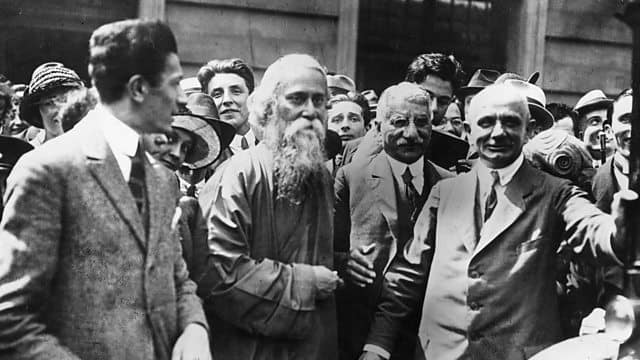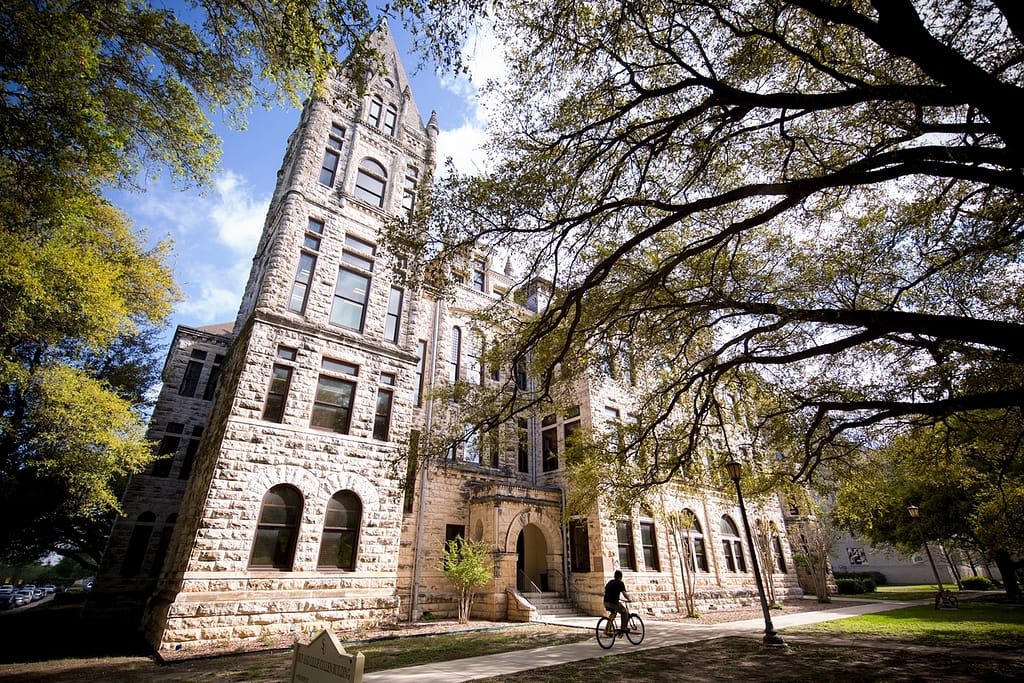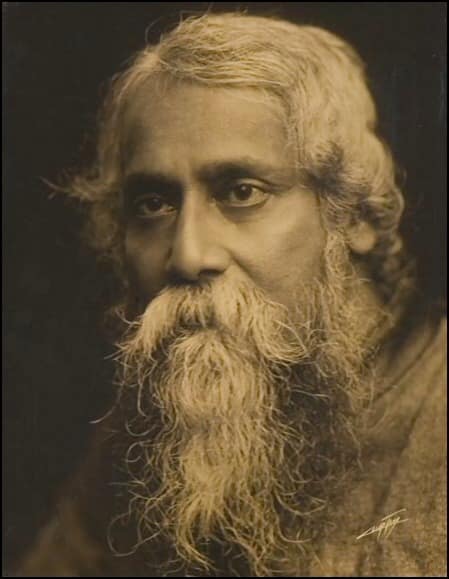
Eight years ago, I mentioned in passing that my paternal grandfather attended a lecture by Rabindranath Tagore at Southwestern University in Georgetown, Texas. Between that time and now, I have discovered an account of that evening. I don’t know who wrote it, but it appeared in “The Megaphone,” the student newspaper.
From time to time I have thought of sharing it, but it didn’t seem quite pertinent. I believe Tagore scholars are already aware of the events of this time. But this account is only available as an image, instead of text. I therefore think I am adding something.
Musing mystic chords of memory

This lecture was the fourth stop in a tour of five cities in five days. The previous day’s lecture was in Denton, Texas, 210 miles away. The final lecture in the tour would be in Shreveport, Louisiana, 310 miles away.
Southwestern University isn’t very well known, but it is the oldest university in the state of Texas. The Ray and Lillie Cullen Building was built in 1900, so it would have been there when Tagore came to speak. Both my grandfather, Frank M. Bass, Sr., and my father, Frank M. Bass, Jr., were Southwestern alumni.

TAGORE DELIGHTS LARGE AUDIENCE
Noted Philosopher and Poet of India Speaks in University Auditorium
Rabindranath Tagore, the distinguished Hindu singer, read to a large audience in the University auditorium Wednesday evening, February 17th.
This was by far the most notable lyceum number that has been given at Southwestern University and those present were indeed fortunate in having before them such a rare and charming personality.
Tagore is India’s greatest lyric poet and spiritual and patriotic leader. He is a distinguished writer and philosopher. His songs are sung in his native country — and have been for years — even by the smallest children.
The poet caught the attention of the audience the minute he appeared on the platform. His personal appearance was unique and characteristic, although not exactly what the audience had anticipated.
Tagore wore an oriental robe of dark gray, which blended with his flowing hair and beard of the same color. His broad forehead, which verified his intelligence; his dark eyes, full of magnetism; and above all, his pleasant smile, gave him the appearance of an artist, possessing a touch of the divine.
Nor did the attention of the audience waver when Tagore spoke his first word. There was a tone of sweetness in his voice. This sweetness gave it strength, and enabled the poet to carry the audience with him to the very end.
Only fragments of Tagore’s poetry have been translated into the English language. The poet explained that he could not give his English translations the music and melody of the original poems. It was impossible to change the music of them in English meter. This was shown when the poet read several songs in his native tongue. They were full of melody and music which were not quite as outstanding in the English translations.
The national anthem, “Thou Dispenser of India’s Destiny,” was one of the most impressive selections rendered. Tagore read it with great depth of patriotism and feeling. The anthem was full of sincere expressions of the poet’s own heart.
The poem about the caged bird and the free bird was full of tenderness and beauty. In these poems could be interpreted Tagore’s own philosophy.
Tagore proved his ability to get the child’s attitude and viewpoint in the sweet and simple poems about the children. They were expressions of his own heart and he read them in a charming manner. An occasional gesture made the poems more effective for they were brought in during the reading so unexpectedly, yet with an artisticness which produced a pleasing and lasting effect.
Tagore brought the evening’s entertainment to a close by reading a story about Hindu life which proved a very strong conclusion.
One could see the greatness of Tagore through his own songs. Indeed, the poems seemed more like prayers and invocations. They were read in that soft, appealing way which made them even more impressive.
Tagore caused the audience to realize perhaps as never before the greatness of India, for in this Hindu poet was manifested the spiritual resources of India.
To whom do I owe this obligation?

Musing mystic chords of memory. The article unintentionally prophesied that “Thou Dispenser of India’s Destiny” would become the national anthem of India. India would not gain independence for another 26 years. But when the Indian Constituent Assembly convened for the first time in August of 1947, the session closed with a unanimous performance of this song. The poem about the caged bird must have been “The tame bird was in a cage“, appearing in The Gardener.
I recall my grandfather sharing on more than one occasion how he was impressed by the magnanimity of Tagore. My grandfather grew up in small towns in Texas. I believe he may have been the first person from India my grandfather had ever seen. I am pleased to have but one degree of separation between myself and Rabindranath Tagore.
The final lines of “Thou Dispenser of India’s Destiny” are:
Thou dispenser of India’s destiny.
Victory, victory, victory to thee.
When I think of these lines, I recall these lines from the fourth and final verse of the national anthem of the United States, “The Star-Spangled Banner:”
Then conquer we must, for our cause is just,
And this be our motto–“In God is our trust.”
And the star-spangled banner in triumph doth wave
O’er the land of the free and the home of the brave.
For both India and the United States, it took a little time between the time the national anthem was written, and the time it became the national anthem. All I know is one day there will be an anthem for a unified humanity.
Musing mystic chords of memory. I feel as if I am discharging some obligation by sharing this account, paying some unpaid debt. But what? And to whom? I’m not quite sure. All I know is that I am following my deepest inclinations, and it never hurts to offer gratitude.
Welcome to Mystery of Ascension! We are students and advocates of the the New Message from God. We are members of a worldwide community. We seek to assist the world in successfully navigating difficult times ahead. We seek to assist the world in successfully emerging into a greater community of intelligent life. You will also find some poetry. Find out more about us here. Contact us here.








